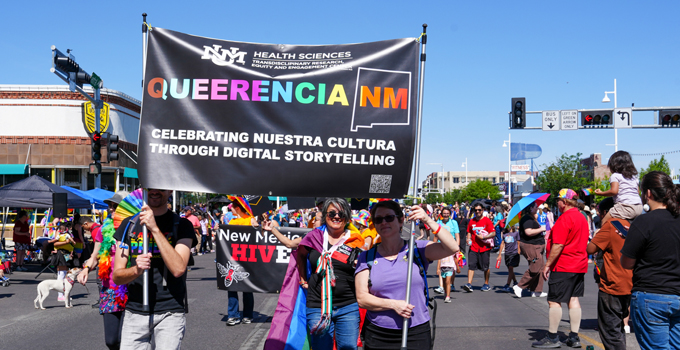In a world permeated by hetero- and cisnormativity, feelings of belonging can be hard to come by for members of the LGBTQI+ community — and research shows that belonging is a key component of positive mental health.
With their digital stories project Queerencia NM, researchers at The University of New Mexico TREE Center (Transdisciplinary Research, Equity, and Engagement Center for Advancing Behavioral Health) aim to cultivate that sense of belonging, connection, community and empowerment that is so critical for every human’s health and wellbeing.
Lisa Cacari-Stone, PhD, MA, MS is an out, queer, Chicana/Mestiza professor with the UNM College of Population Health (COPH) in the department of Health and Social Policy and Executive Director/PI of the TREE Center.
"Queerencia is adapted from the Spanish word querencia,” says Cacari-Stone, “meaning a beloved place – both physical and metaphysical. Querencia invokes a connection to land, people and time. It evokes a sense of endearment to home, a pride and love of place and people that shape our individual and collective identity.”
The first question asked of project participants is “What is Queerencia for you?” It’s a question that invites folks to reflect on the places and spaces they love, their heritage, and where they feel safe and celebrated.
Founded during the 2019 remembrance of the 1969 Stonewall uprising, Queerencia began with a series of infographics and floats in both the Albuquerque and Santa Fe Pride parades of that year. TREE Center folks participating in these queer events noticed there weren’t any discussions happening about mental health or holistic wellness.
“A few summers ago, Daisy and I took a course led by Lisa, and for our project we decided to work with the LGBTQ+ population,” says Thomas Chavez, PhD, Assistant Research faculty with the UNM Department of Psychiatry and Behavioral Science and a core research team member at the TREE Center. “We focused on health and wellbeing among our communities and the challenges and barriers faced, especially in rural areas where there’s a lack of resources.”
Bringing this work to Cacari-Stone prompted her to share the idea behind Queerencia, which really resonated with Chavez and his research partner, Daisy Rosero, MPH. A graduate from the UNM COPH, Rosero has been with the University for more than 23 years. Now a research scientist at the TREE Center, she specializes in program implementation and evaluation and co-leads the Queerencia NM project with Chavez and Cacari-Stone.
“As part of those conversations we had several years ago,” Rosero says, “a lot revolved around culture, and how queer culture is not monolithic. There is so much richness within queer culture… and in this project we really want to capture those voices from diverse experiences. Right now, we’re looking at stories from LGBTQ+ New Mexicans who are Hispano, Chicano, Latine - and at some point, we hope this project expands to include voices from the many different regional cultures we have.”
The Queerencia team is looking for stories from a wide range of people. Any member of the LGBTQI+ community, 18 or older, who is Hispanic, Hispano, Nuevo Mexicano, Indio-Hispano, Spanish, Latinx, Latino, Latina, Latine, Chicano/a/x, Mestizo/a/x, Afro Latinx, and/or “undocuqueer” is invited to contribute to the project. The Queerencia project aims to connect LGBTQ+ people and communities through shared cuentos and testimonios (stories and testimonies) of triumph and resiliency, and anyone interested in participating can learn more on the Queerencia NM website.

I want to emphasize the critical role of visibility and space at this time of structural violence against our communities.
